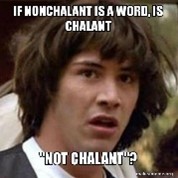Are you looking for a word to describe erratic or aggressive behavior? If so, you could say that the person is being "chalant" towards you. This post unpacks the meaning and origin of this expression.
Meaning
The expression "chalant" is a derivative of "nonchalant." If someone or something is nonchalant, they act in a calm and collecting manner, or they are indifferent to what's happening around them. Nonchalant comes from the French word "nonchaloir," meaning "unconcerned."
So, if nonchalant means cool and indifferent, chalant means concerning, frustrating, and possibly hostile. The word appears in humorous statements as a slang reference to being unacceptable or "not cool." People can be chalant, which means that they display overly annoying or frustrating behavior.
A building or premises could be chalant, meaning that it's a dump. Or it can mean a place with insufficient services and amenities. In either case, you are not happy with the results you receive. It's a way of describing someone as an annoying or arrogant person.
Example Usage
“This party is so chalant, I don’t know any of these people, and they’re making me feel anxious. Let’s get out of here.”
“Oh, that is so Chalant. Why can’t you just relax and enjoy the sunshine? It’s great out here today. Save the drama for tomorrow.”
“That behavior is so chalant. I bring you here to this nice place, and you start behaving like a neanderthal. This is so embarrassing.”
“I’m tired of your chalant behavior whenever we go out. It seems like you just can’t behave yourself, regardless of the venue. We are done here, and you can go out by yourself from now on.”
“You have no tact and no class, We all thought you were a cool guy, but it turns out your nothing but a chalant weirdo that we need to cut loose.”
"This hotel is so chalant that it's making me feel nervous. Is it a haunted house or something? Why is there no one at the front desk?"
“That guy's behavior is so chalant. He’s actually annoying, and I’m starting to feel frustrated with his behavior. Someone make him stop or tell him to go away.”
“This place didn’t look as chalant as when I made the booking. They always put the best pictures o the site, and when you get there, it’s a dump.”
“I wouldn’t call his behavior charming at all. I found him quite chalant and annoying but to each their own.”


Origin
The expression “chalant” has unknown origins. The original word “nonchalant” appears in English in the 1700s.
The term has French roots and means indifferent or carefree. The earliest reference to the use of nonchalant traces back to 1734, and it’s still in use today.
However, language experts have no idea when the phrase first appeared in English. According to the Urban Dictionary, the earliest entry of the word into its database comes from September and November 2003.
Phrases Similar to Chalant
- Hyper.
- Anxious.
- Aggressive posture.
Phrases Opposite to Chalant
- Nonchalant.
- Cool as a cucumber.
What is the Correct Saying?
- Chalant.
Ways People May Say Chalant Incorrectly
Many people confuse “chalant” and “nonchalant.” However, Chalant is grammatically incorrect, and the word doesn’t officially exist. So, its only use is slang, and it only suits use around people that understand the slang meaning. Using it around older generations will likely have someone correct your speech.
Acceptable Ways to Phrase Chalant
You can use the expression “chalant” as the opposite of “nonchalant.” If someone is nonchalant, they are calm, cool, and collected. So, if someone is “Chalant,” it means they feel uptight and frustrated with something. Chalant isn’t actually a word, so using it in professional conversation isn’t appropriate.
It’s a form of slang that people use to describe situations that don’t go their way or people that act hostile to them. You can use it in cases where you’re asking someone if they feel anxious or distressed.